Singing is at the heart of our mission at Carus
11 questions to paediatrician & publisher Johannes Graulich
Since joining the family firm in 2001, Johannes Graulich, whose previous career was in medicine, has made his mark on Carus-Verlag. We spoke to him about projects close to his heart and milestones in the history of Carus.
1. You were a paediatrician at the renowned Charité Hospital in Berlin before changing direction in 2001 to Carus-Verlag, which your parents founded. That’s a really unusual change of direction.
Yes, my parents’ request was a surprise to me at the time. After several years in medicine I was ready to take up a new challenge. Music, and especially choral music, had appealed to me throughout my life, so in that respect it wasn’t a completely new start. And I had practically grown up with Carus in the family.
2. In 2009 Carus and SWR launched the Liederprojekt, a charitable project devoted to singing with children. Presumably this is something close to your heart as a paediatrician?
Because singing and active music-making are so important for health, as a paediatrician it was a particular concern of mine to promote singing with children. As many studies have shown, singing strengthens community spirit and self-confidence. As well as language and articulation skills, singing also promotes artistic expressiveness – and lifts the mood!
Through the corona pandemic this topic has become even more relevant, because singing together – alongside many other activities – disappeared overnight. Many children have been harmed by the pandemic. Free time is mainly filled with digital media, instead of with “real experiences”. A development which worries me. What could be better for encouraging children’s cognitive, emotional, musical, and social development than singing and active music-making with other children? Unfortunately the situation in many choirs, especially in children’s and youth choirs, is alarming, as we learned from the ChoCo Study about the situation of choirs in times of corona which Carus co-initiated in 2021. After the end of the pandemic we need to quickly succeed once again in offering children an excellent range of opportunities for choral singing.
Dr. Johannes Graulich (b. 1967) studied medicine at the Freie Universität Berlin and the University of Washington, USA and subsequently qualified as a specialist paediatrician at the Charité Hospital in Berlin. In 2001 he joined Carus-Verlag, and since 2003 has been Managing Partner. He is a member of the German Society of Paediatrics and Adolescent Medicine, and a Board Member of the Neue Bachgesellschaft. He is involved in the Copyright Collection Society VG Musikedition, the German Music Publishers’ Association, and GEMA.
3. Does music for children play a greater role since you became Managing Director?
Actually, music for children has always been important to Carus. I see it as a key activity for us as publishers. Over the last 20 years the Landesmusikakademie Ochsenhausen has developed into an important partner and generator of ideas. This collaboration resulted in our multi-volume school choral collection series chorissimo! which supports singing in schools – from unison singing in kindergarten, through beginning to sing in parts in primary school choirs, to more ambitious choirs in secondary schools. We have also published very successful material for children’s church choirs, such as the two-volume Freiburger Kinderchorbuch. I also see our efforts to offer attractive repertoire for children’s choirs and youth choirs in working with versatile composers, such as the Berlin composer Peter Schindler whose works are published by Carus.
4. In 2017 the “Bach vocal” project, the complete edition of Bach’s sacred vocal works, was published by Carus. This was presumably one of the biggest editorial projects ever undertaken by the company?
The sacred vocal works of Johann Sebastian Bach are so extensive that it was a challenge for Carus to publish his output in new Urtext editions which reflect the current state of Bach research. And it wasn’t just a question of publishing the conductor’s scores, because for each work we also published the complete materials for all musicians involved in a performance.
We are particularly experienced in this field of scholarly-critical music editions; Carus has published vocal works by composers from five centuries in modern Urtext editions. I am thinking here of vocal works by Monteverdi, Schütz, Mozart, Haydn, Brahms, Mendelssohn, Schubert, Fauré, Puccini, and Verdi. But the Bach project had a quite new dimension because of Bach’s extensive output of cantatas, with around 200 surviving works. The productive realm of Bach research is constantly making new discoveries, and editions have to be adjusted as a result of this. Here, we benefitted from an intensive and long-term collaboration with the international center for Bach research, the Bach Archive in Leipzig.
Not only in terms of Bach was it a tremendous stroke of luck for Carus that we succeeded in attracting Dr. Uwe Wolf, one of the leading Bach scholars from the Bach Archive, to Stuttgart in 2011. He has been Chief Editor at Carus since 2011, succeeding my father Günter Graulich.
The LIEDERPROJEKT
- over 250,000 song books sold
- www.liederprojekt.org – a free song archive with over 630 songs
- 11 high-quality song books with singalong CDs, 14 choral collections, 23 CDs, 7 voice and piano /instrumental volumes
- Recordings by over 100 singers and many children’s and adult choirs and instrumentalists
- over 465,000 Euros donated to date to projects which support singing with children.
The Berlin composer Peter Schindler. His compositions for children’s and adult choirs are real classics in the Carus catalog.
5. You have further expanded the Carus CD label. What were your strategic considerations in doing this?
Again and again in our researches, we come across unknown, but excellent choral works by composers which are unjustly not performed; for example, works by Lili Boulanger, Louis Spohr, Jan Dismas Zelenka, and Gottfried August Homilius. The last of these, a student of Johann Sebastian Bach and Kreuzkantor in Dresden, left an impressive body of motets and cantatas which was, however, barely known. After publishing these highly interesting works in critical editions, we wondered why Homilius was still hardly ever performed. But then several recordings, coupled with the Carus music editions, helped these works to achieve a breakthrough, especially the interpretations of his motets by Frieder Bernius.
Another main focus has been on the major complete recordings, such as the recording of all Felix Mendelssohn Bartholdy’s sacred choral works with Bernius’ Kammerchor Stuttgart, and the complete recording of the works of Heinrich Schütz with the Dresdner Kammerchor conducted by Hans-Christoph Rademann. As well as the major works, which are frequently performed, there are real discoveries of works which are largely unknown but are of similar quality. It is precisely this approach which distinguishes Carus from other publishers: we don’t just concentrate on music editions of the well-known top works, but show the full breadth of vocal compositions of the preceding centuries – we want to make these audible too.
Here, nobody had any idea what a success story the LIEDERPROJEKT would become. Presentation of the Wiegenlieder volume at the Frankfurt Book Fair in 2009, with many who were involved in the project. Back row, 3rd from left, the singer and initiator Cornelius Hauptmann, on the right next to him Frank Walka, illustrator of the successful song books.
A great honor for the LIEDERPROJEKT: an award as part of the “Germany. Land of Ideas” initiative from the Federal President, presented by Minister-President Winfried Kretschmann to Dagmar Munck (SWR) and Johannes Graulich.
6. Carus has also produced surprisingly good recordings for children.
Yes, in the area of music with and for children, the starting position was different again. There are lots of recordings, but often with little appeal. But children, too, deserve musical productions of a world-class level. Out of this conviction came the recordings of 42 of the most beautiful lullabies, a project which was initiated by the singer Cornelius Hauptmann.
These were the basis for the LIEDERPROJEKT, a charitable project which we realised with SWR. Famous singers, top-class choirs and vocal ensembles, and lots of children have recorded lullabies, children’s songs, Christmas carols, and folk songs. Beautiful song books with illustrations by Frank Walka were created, as well as numerous new piano and choral settings by over 100 composers and arrangers. At liederprojekt.org a high-quality, non-commercial, digital song archive has been created, like no other I know. And all of this has been enthusiastically received.
7. How has the company changed over the last years? Has the core business changed in the face of increasing digitisation in everyday life?
We all spend several hours a day using digital technology, whether it be at work or at home, on a smartphone, PC, or tablet. That automatically changes the expectations of a modern music publisher. We still enjoy our greatest successes in the area of music editions. But we are also in mid-transition to an increasingly digital media business which, as well as music editions, also offers many other products for choirs, both analog and digital. In this process, high-quality music editions will never lose their importance!
Carus on the international stage: Chunlung Lin (Pana Musica) and Johannes Graulich at the Music China fair (2006).
Three Carus personalities: Günter and Johannes Graulich with Uwe Wolf. Wolf, a musicologist and previously an editor for Carus of many years’ standing, took over as Chief Editor from Günter Graulich in 2011.
8. Now the company’s 50th anniversary is just around the corner. What are the company’s main areas of focus, and what remains ongoing, depending on corona?
At Carus we have always used our success to invest further in expanding our program. And with this approach we have really come a long way: we have published music editions of over 45,000 choral works.
In Urtext editions, Carus already has a unique position internationally because of the range and quality of our catalog for choirs. The vocal works of Monteverdi, Bach, Mozart, Haydn, Beethoven, Mendelssohn, Schubert, Fauré, Puccini, Verdi, and many others are published by Carus in modern Urtext editions. Our library of vocal scores, with over 750 editions, is unrivalled worldwide. At the moment we are focussing intensively on the choral music of Bruckner, the next important anniversary, and Handel, whose oratorios represent a treasure trove for choirs. We are also very active in the area of contemporary vocal music.
And of course, much remains to be done: the program of digital editions needs to be developed, other important works are still not in our catalog, much remains to be discovered – and every edition has to be kept up-to-date. There is therefore a wish-list which is unfulfilled, and also some projects which have had to be postponed because of the pandemic.
9. In 2015, Carus opened up a new business area with the launch of carus music, the choir app, a practice aid for choral singers. Can such an investment by a specialist publisher, not aimed at the general public, pay off?
Our practice aid for choral singers has been enthusiastically received by choirs, and reached break-even after three years. There is a real need for this, mainly from singers missing rehearsals, but also because of an increasing number of project-based choirs. We have recently relaunched the app as a browser-based version, so that practising is possible not only with smartphones, but on all devices which have a browser.
A memorable moment in the company’s history: the presentation of the Bach box sets in the Bach Archive Leipzig in December 2017 with many who were involved with the project, and friends of the company. In the middle – with the weighty box sets – Chief Editors Dr. Ulrich Leisinger and Dr. Uwe Wolf.
Carus presents its first app carus music for choral singers at the International Music Fair in Frankfurt, 2015, with NMZ Chief Editor Dr. Juan Martin Koch. An important step in digitisation and a great success.
10. With all these successes and exciting publishing activities, do you sometimes miss medicine?
Yes, absolutely! My profession of paediatrician is my passion, but unfortunately I have hardly been able to practise this for several years. On the other hand, I am really proud of what we have achieved as a business and of how Carus has established itself in the top rank of vocal music publishers worldwide. We have been able to inspire many choral directors, church musicians, and school musicians, and have also received much acclaim internationally. In 2018 the media manager Ester Petri joined Carus as Managing Director. She has brought fresh inspiration to the company and takes the pressure off me enormously so that I can once again see my small patients.
11. Which vision do you have for the future of Carus music publishers?
Without doubt Carus will continue to develop its main focus, choral music. Right from the beginnings of Carus, we have sought and established a dialog with choral conductors from all over the world. This is now to our advantage, for closeness to customers and service are key factors in our success.
But Carus doesn’t only stand for choral music, but for singing in general. Getting people to sing, making singing in every form easier and improving it – that is at the heart of what we do, it’s our mission. Vocal music is of enormous significance to our staff and members of the Graulich publishing family. And with a glance at our 50th anniversary, and hopefully towards the end of the pandemic, we have lots to do.
Ester Petri and Johannes Graulich – jointly responsible for the Carus-Verlag business since 2018
Reception at the conclusion of the Schütz Complete Recording in 2019 with Hans-Christoph Rademann (2nd from right) and several colleagues involved in the project



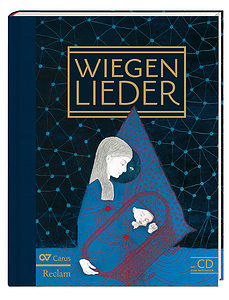
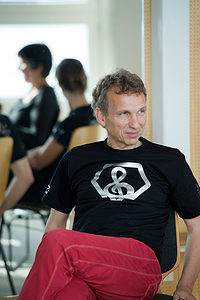
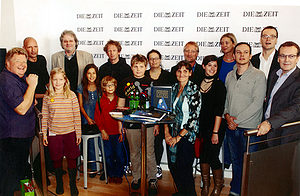
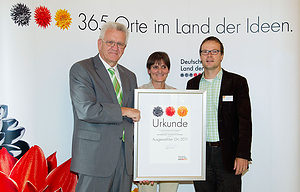

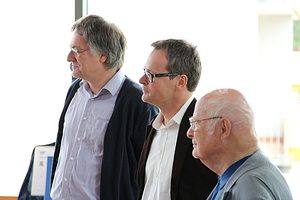
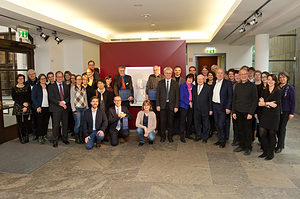

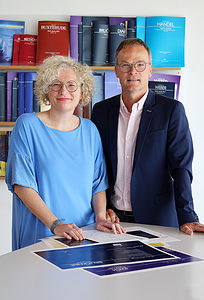
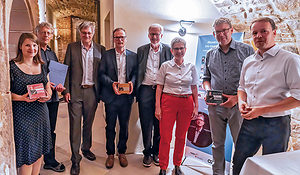


Many congratulations on your 50th Anniversary. From the earliest days of Carus I benefited from the wonderful range of choral works which became accessible in excellent, scholarly performing editions. Works by Schütz, Bach, Vivaldi, Brahms, Mendelssohn, Reger, Rheinberger, Schubert, Tschaikowsky, and dozens of other composers became available to stimulate and enhance the work of choirs world-wide. I personally benefited enormously from the generosity and warm friendship of Günter and Waltraud Graulich, and am delighted to be able to record my great indebtedness to them and to the current leadership at Carus who continue to promoted the very highest musical standards.